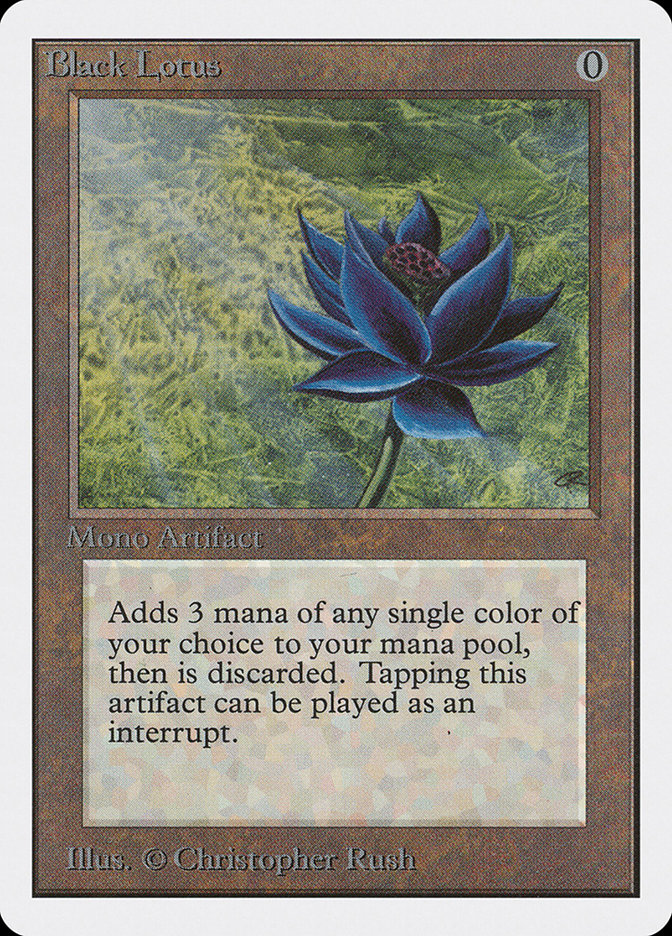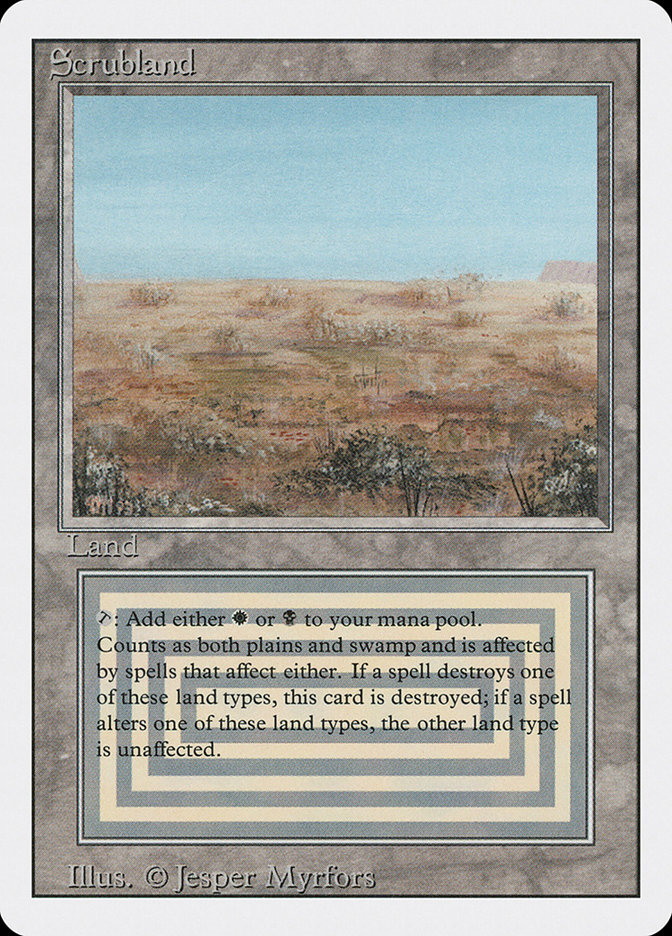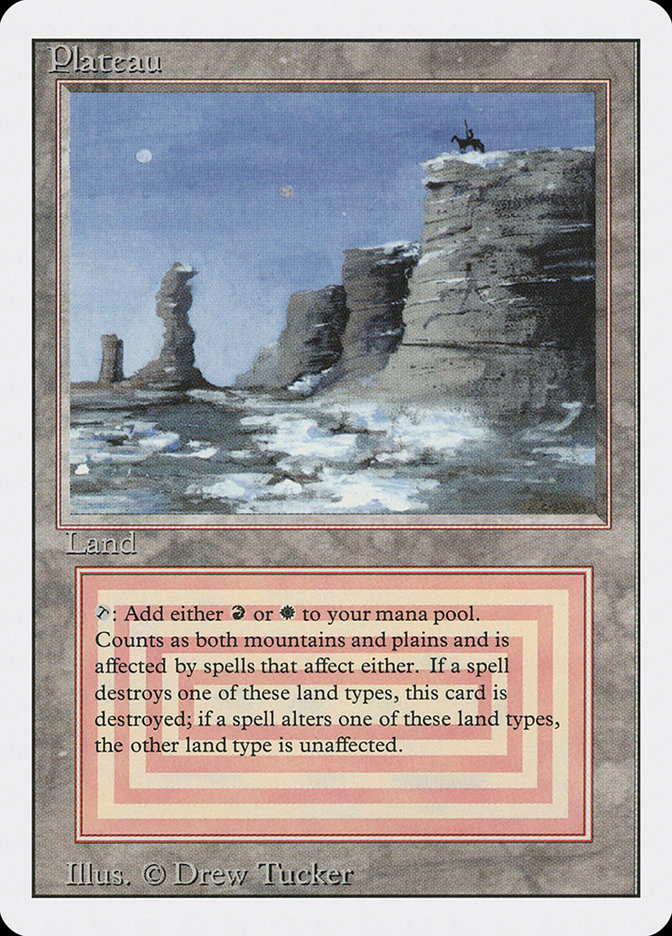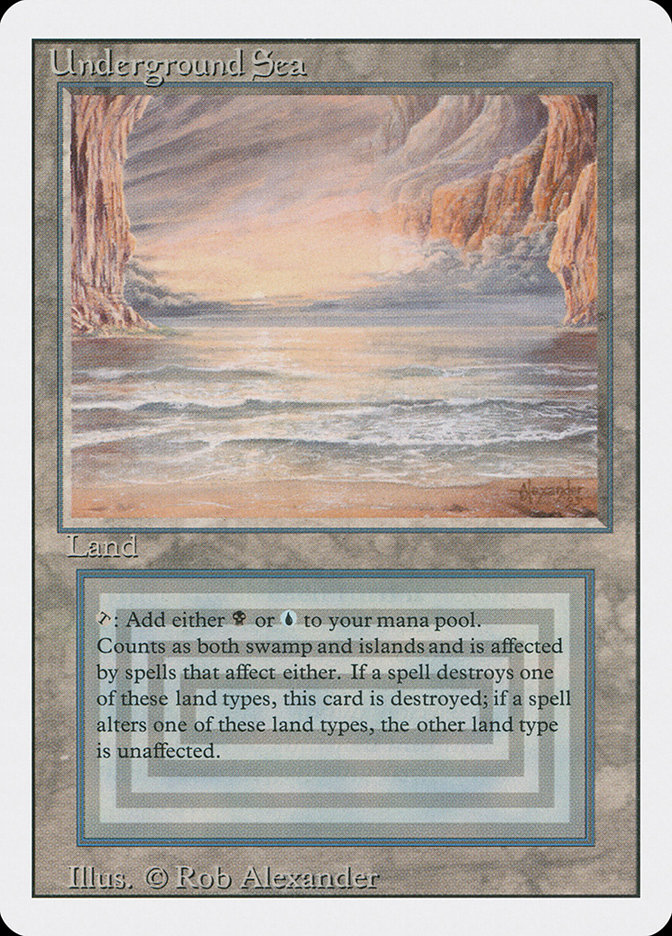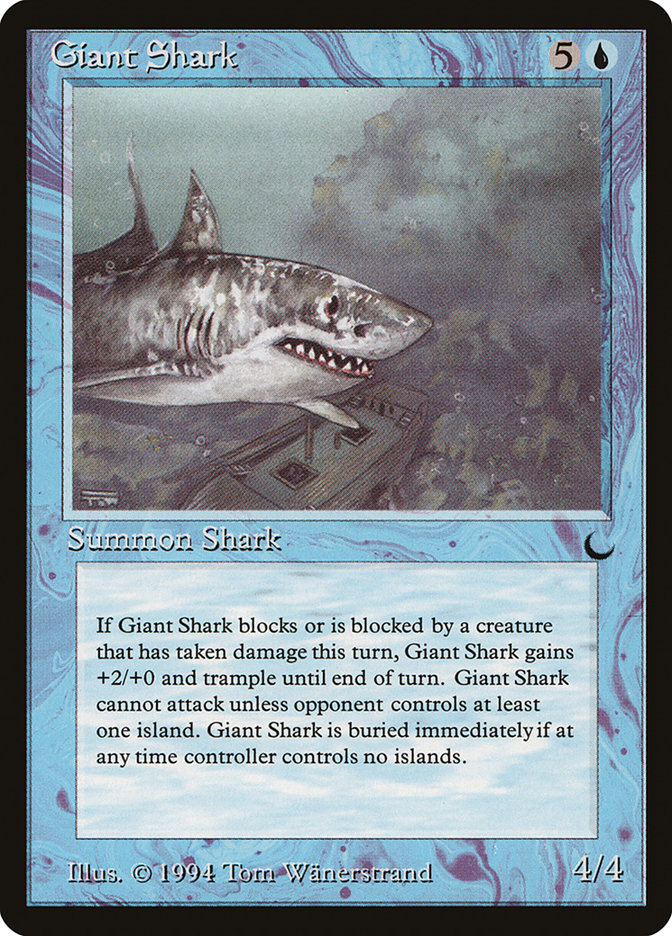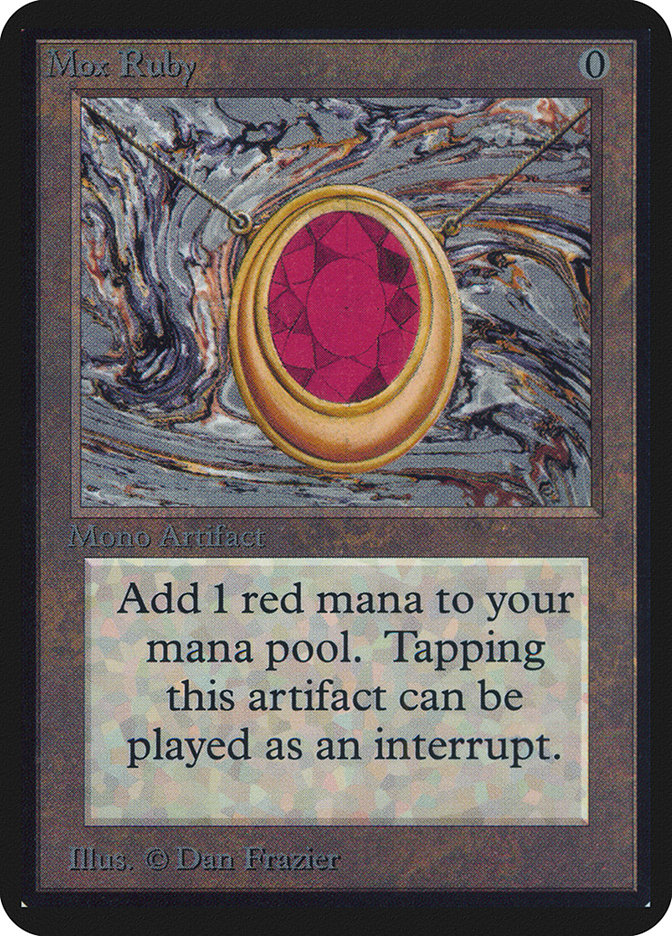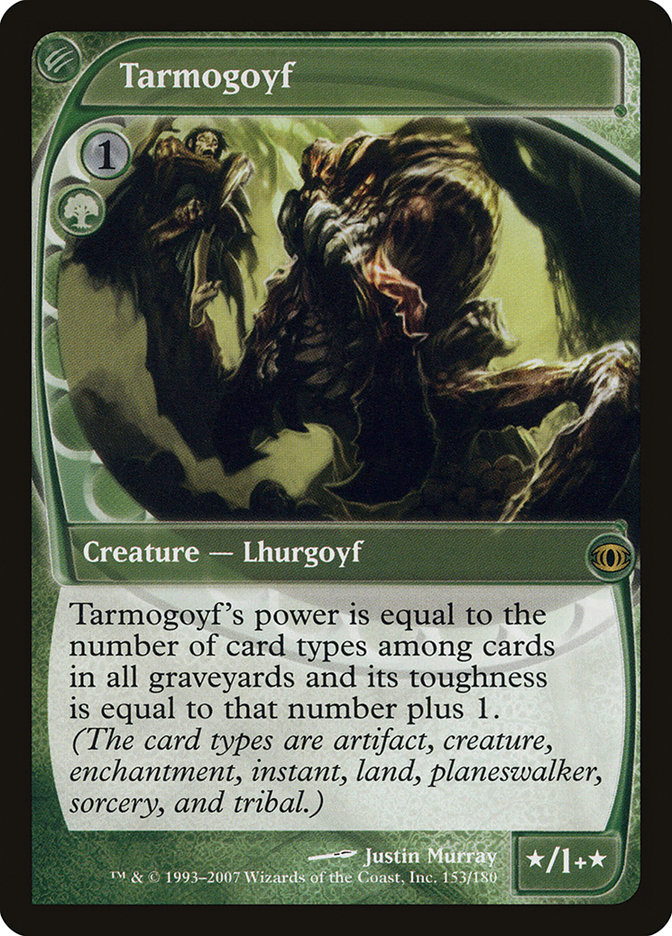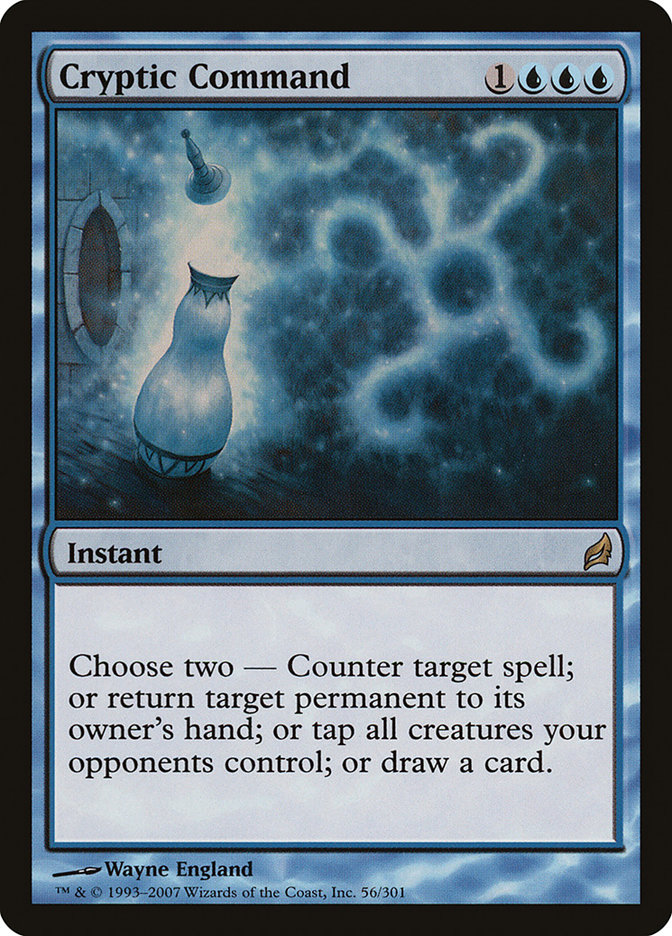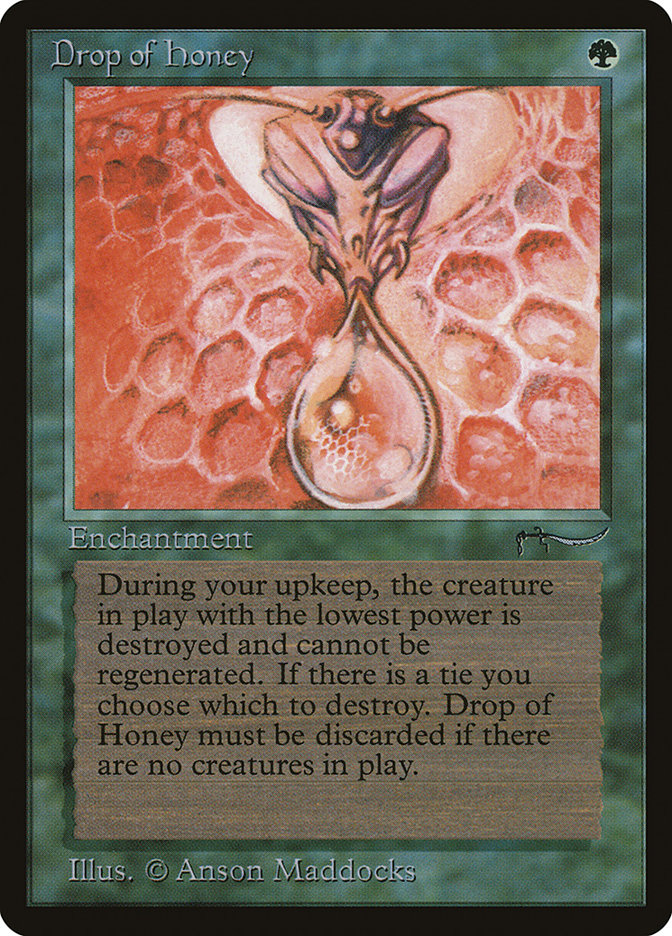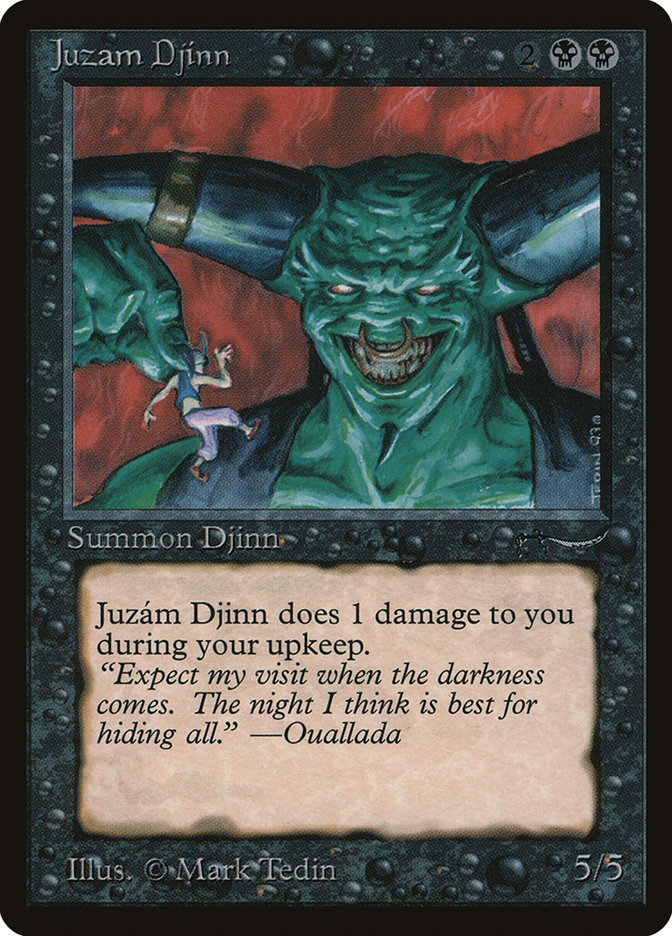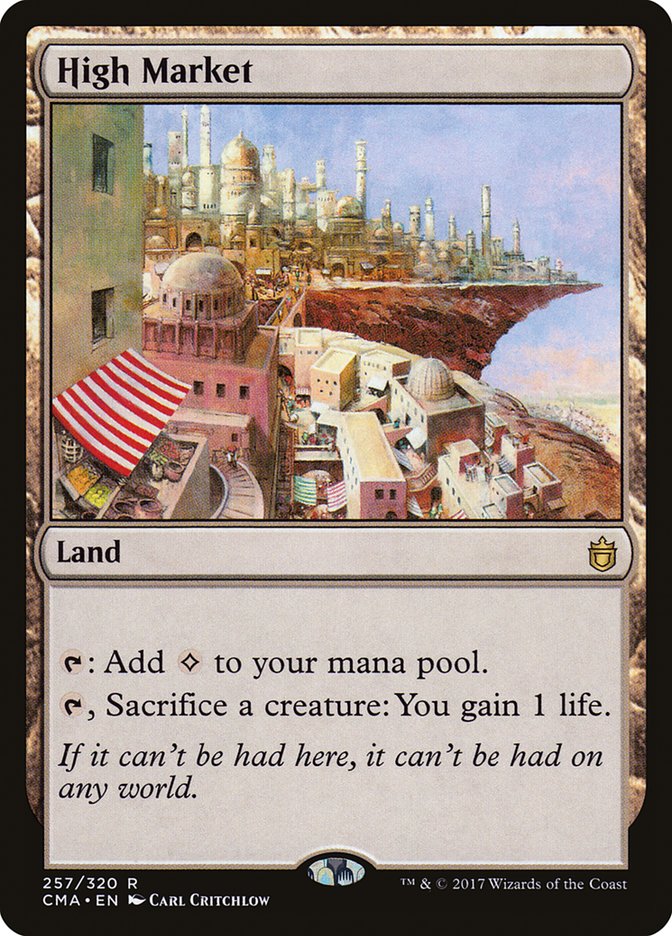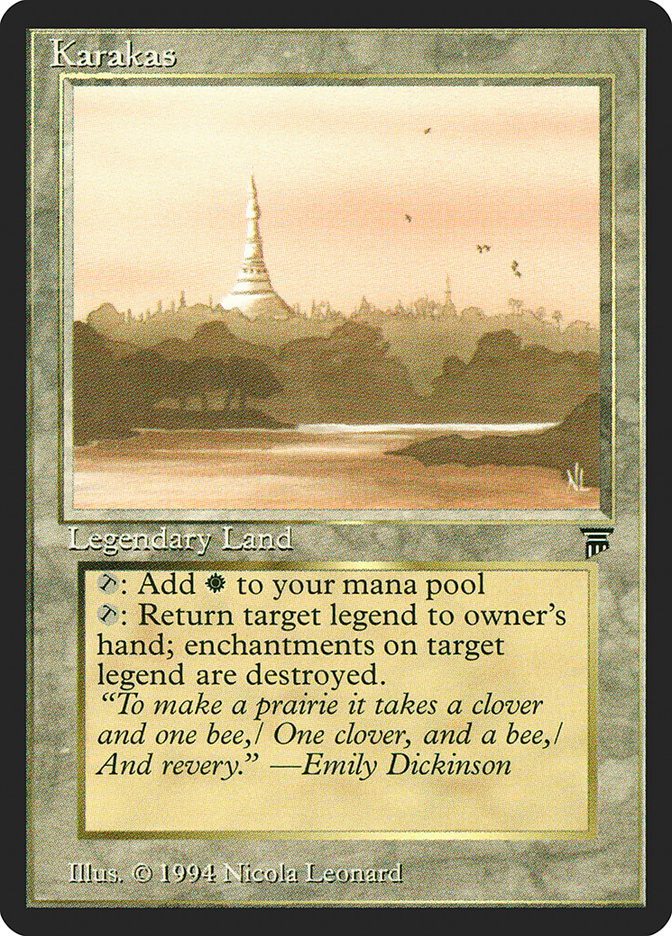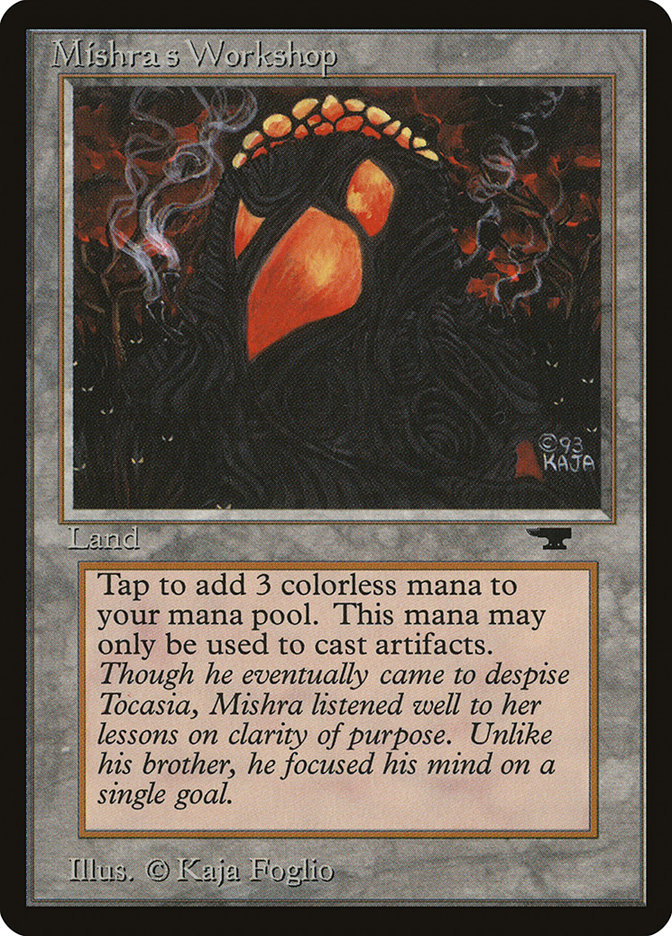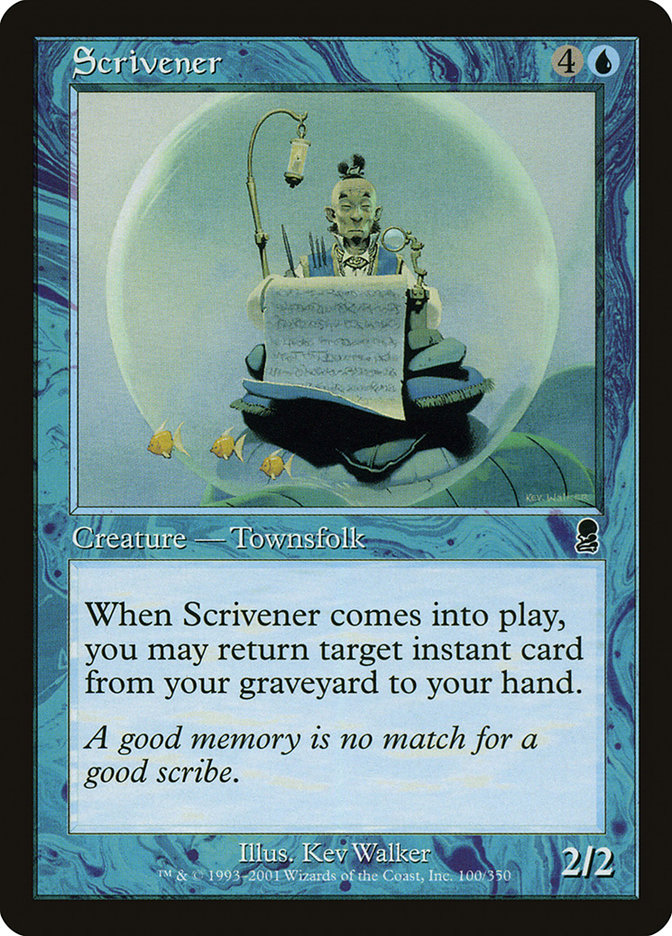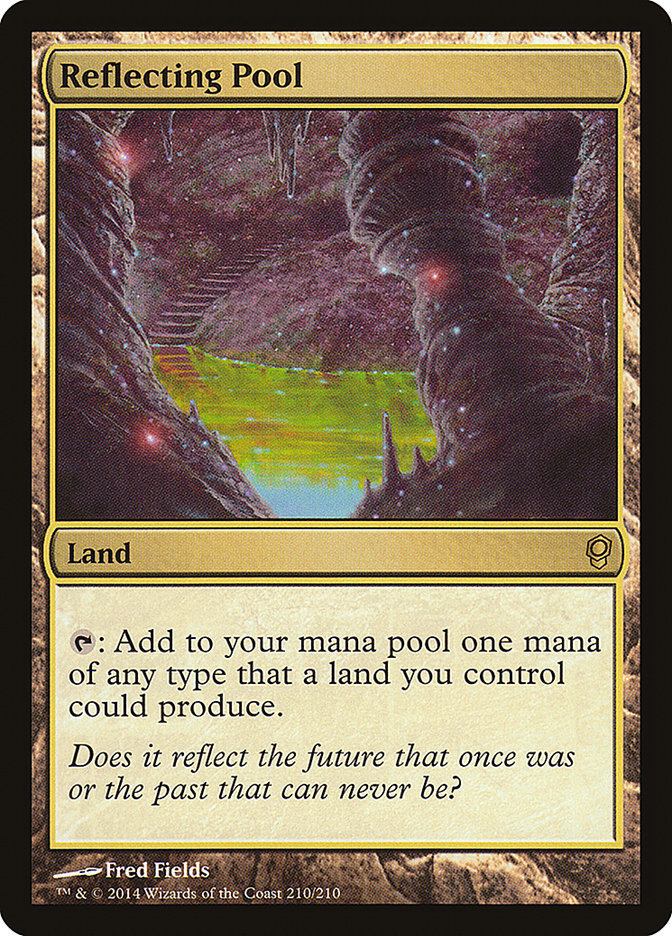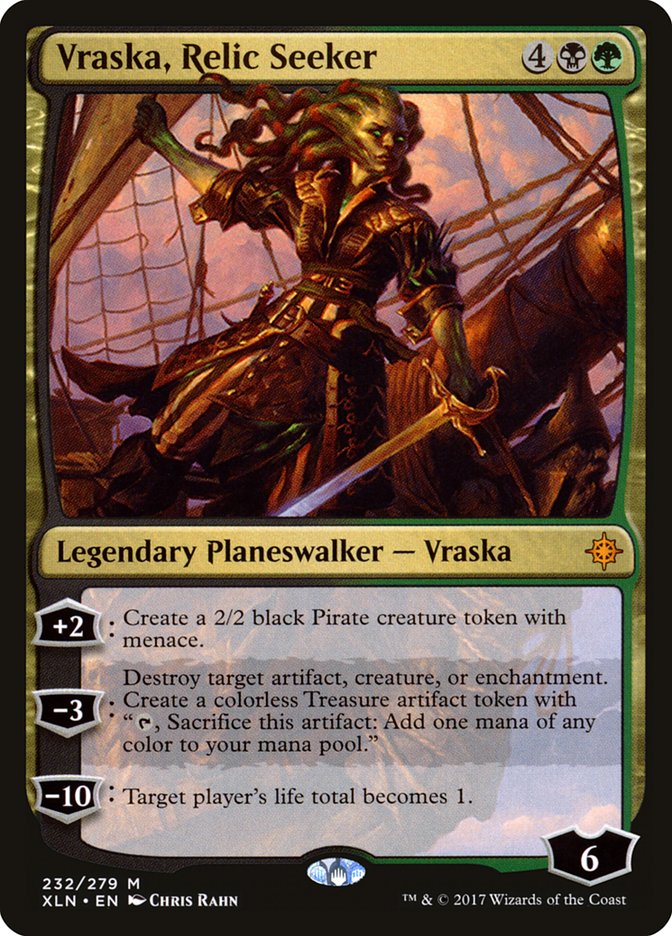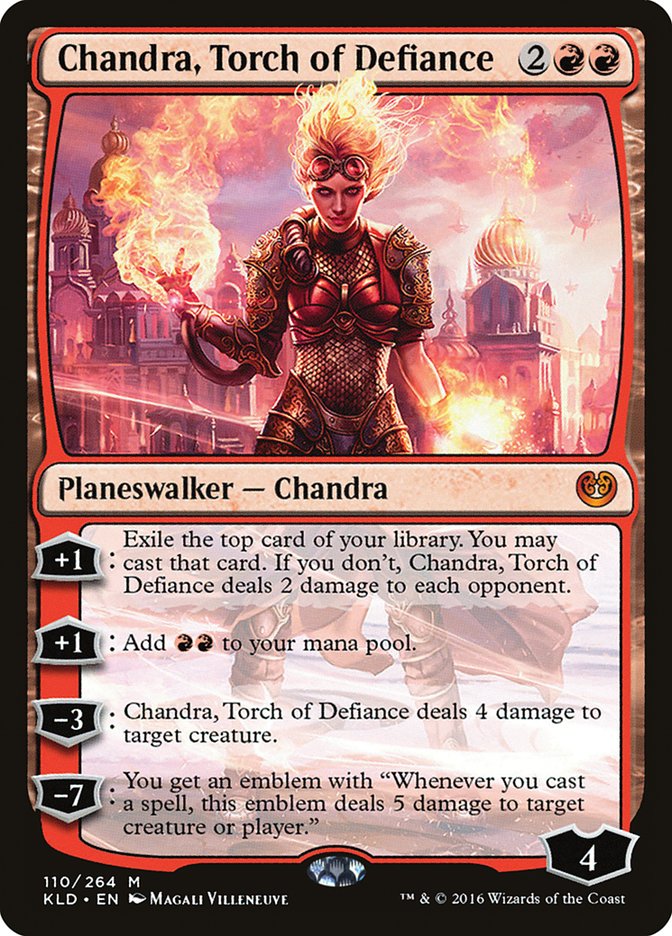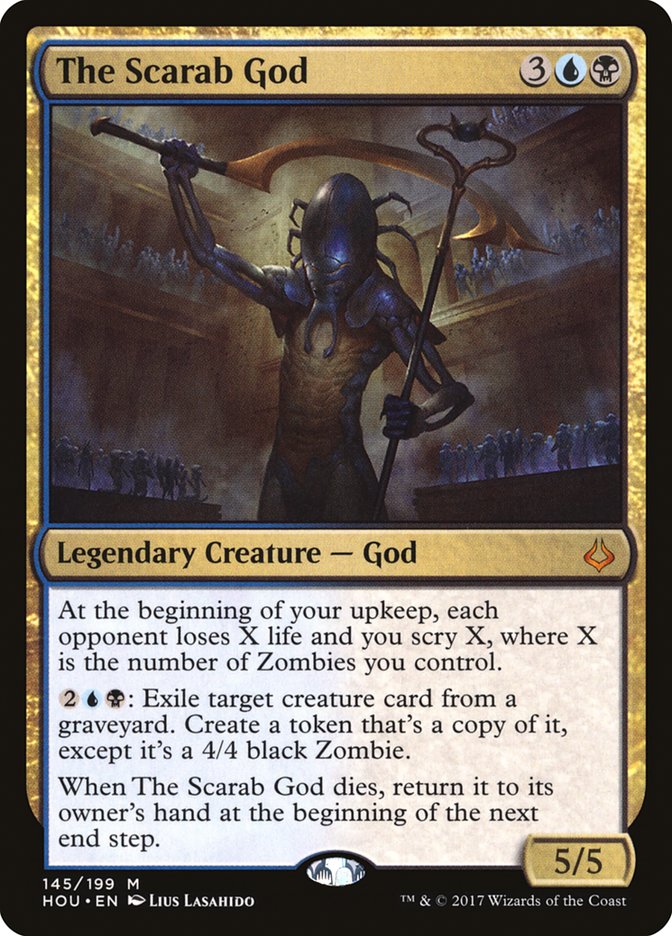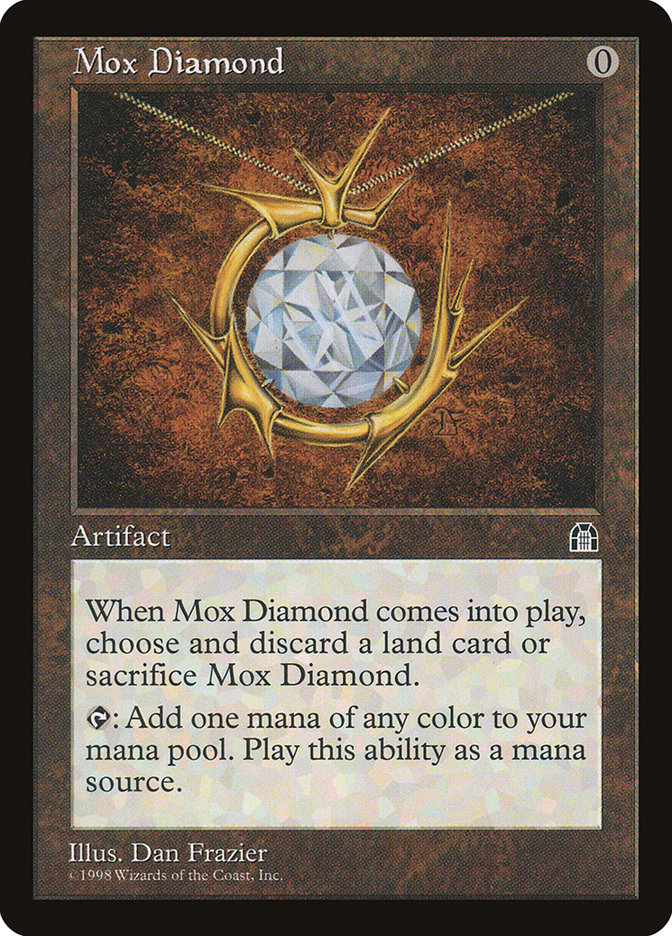1.
This essay won’t make you money. It won’t help you maximize the value of your collection, it won’t make Modern more affordable, and it doesn’t contain any speculation advice whatsoever.
It doesn’t even have answers to the questions it attempts to raise.
2.
Every Saturday at 6am, weather permitting, I’m out the door on my way to a garage sale. I buy up unwanted items, mostly video games, and flip them on eBay for a profit. The paydays are rarely huge, but the treasure hunt is fun and the work fits with my fractured grad school lifestyle.
Last week, I was met by a demoralizing sight at my very first sale of the day. Three guys, one wearing a T-shirt with a dragon on it, were already walking back to their car with a boxful of games. I had arrived at the sale half an hour early, a few minutes before the sun had actually peeked out over the thin pink horizon. I was still too late. The man in the dragon shirt rolled his eyes at me as I walked past him, unable to contain my disappointment. Our town is small enough that we see each other almost every week. Sometimes I get there first. Sometimes he does.
I strode up to the sale anyway. Why not? All pickers have a slightly different base of knowledge, and there might have been something valuable there that my competitor hadn’t recognized. After a few minutes, I saw it: three Zendikar-era fat pack boxes. My heart began to race, but the surge of adrenaline slowed once I looked inside. Old Yu-Gi-Oh! cards. Commons, mostly. “I saw your boxes,” I said to the proprietor, who was wheeling a rack of clothes out of her garage. “Do you have any Magic cards for sale?”
“Let me get my husband,” she replied. “That’s his obsession.”
A man strode out of a garden shed a few minutes later, a couple of bags of potting soil in his arms. He was an older guy, balding a bit, with scrubby facial hair and a confident grin on his face. I liked him immediately.
“You out looking for Black Lotuses, or just want to see what I’ve got?”
“I don’t expect to find a Black Lotus at a yard sale,” I replied. Though isn’t that the dream? “I’m happy to look at whatever.”
He disappeared into the house for a few minutes and then returned with a couple of long boxes. “These are my extras. I’ve kept four of most cards in my collection, so I don’t need these.”
“How much are they?”
“Depends on the card,” he shrugged.
I started to flip through the cards as fast as I could. I was on the lookout for things like Force of Will, which looks like a useless common to older casual players who haven’t so much as heard of the Legacy format. At the same time, I knew that I couldn’t stand in that driveway forever. Wilmington’s summer humidity had finally broken, and the town was full of sales. Every moment I spent flipping past copies of Mons’s Goblin Raiders was a moment I wasn’t beating my dragon-shirted foe to the best score of the day.
“Got any of those double lands?” I asked. “You know, the old ones with the concentric rectangles in the rules box?”
This was a question I asked without thinking, almost by rote. I have always played dumb when looking through cards at garage sales because there is nothing worse than a garage sale proprietor who suddenly gets it in their mind that their old junk might have hidden value.
At that point, it doesn’t matter if I reveal myself as an expert and assure them that you are making a fair offer. Everything I say will be treated with hostility, every card will be looked up on multiple websites, and any attempt to pay less than full retail will be treated like a slap in the face. I’ve left sales like this empty-handed more than once, knowing full well that the cards will eventually be thrown back into the closet in frustration after the owner rejects a worse deal from some local shop.
This is also why I am rarely able to trade with anyone these days. Once people know who I am, they immediately assume that I am hustling them with some piece of secret knowledge that I haven’t shared with the world yet. It doesn’t matter if the trade is even and they’re getting a card they want for a card they don’t. “Thanks, but no thanks,” I’m told, and all I can do is pick up my binder and walk away.
The man at the garage sale scratched his beard and grinned. “I’m not willing to part with any of my dual lands,” he said. “They’re all in decks. And besides, they’re worth hundreds of dollars.”
“You don’t say,” I replied, continuing to shuffle rapidly through his bulk.
Fifteen minutes later, I had pulled a stack of about fifty cards. Most of them were still bulk, or at least pretty close—cards like Dismiss, which are only worth about a quarter on a good day. I had to admit, the man had done a remarkably good job separating his wheat from his chaff. My best find—my only good find, really—were a couple of Stronghold copies of Intruder Alarm. Did you know that Intruder Alarm retails for $15 now? Always check your bulk, kids.
The collector pawed through my stack for a minute or two, chuckling. “Just want to see what kind of mage you are,” he said, and I shrunk back a little, embarrassed. There wasn’t much rhyme or reason to my pulls other than some vague memory of monetary value. If he were looking for my deckbuilding soul in that pile of chaff, he wouldn’t find it.
I paid the man three dollars for the cards, vigorously shaking his hand afterward. “He’ll be down at the shop later today, teaching the game to some of the kids from our church,” his wife told me. “Maybe we’ll run into you down there sometime.”
“I hope so,” I said, the words feeling sour as soon as they ran out of my mouth. If I did run into him down at the shop, I realized, it wouldn’t be long before he learned that I write Magic finance articles and know quite a bit about the price of “double lands.” We really do live in a small town, I remembered, and the Wilmington Magic community is even smaller than that.
But it was too late to come clean, or offer more or do anything other than just walk away. Heck, it wasn’t like the cards I’d bought from him were worth much more than I’d actually paid. Even still, I pictured his crestfallen face stuck in a moment of despondent realization that may or may not ever arrive. There are so few genuinely nice people in the world, and I’d taken one of them for a ride in order to make maybe—maybe—twenty dollars.
3.
I want to believe that I add value to the world. Don’t we all? We each craft our own narrative, one in which we are the hero and our actions are always righteous. Any action can be justified. Any belief can be reconciled.
Despite all evidence to the contrary, there are people out there who have convinced themselves that the world is flat. They refuse to believe otherwise, despite all evidence to the contrary. Convincing yourself that you are a good person doing good things is a darned sight easier to swallow than that.
4.
I used to be a trade shark. I don’t like to admit it, but it’s true.
I got my start writing about Magic finance on a Pack to Power blog that chronicled my journey from a single pack of Zendikar to an Alpha Mox Sapphire in just about a year. You can’t go from pack to power in a year, even a year with as much market growth as that one, without being a trade shark.
I justified this behavior in two different ways.
First, I was always open about the need to “get value” on my Pack to Power trades. I never misled anyone about my intentions, and I didn’t deal with the folks who weren’t down with that reality. Many of the people at my local store were excited about the project. Some of them even read my blog. This was before Pack to Power became a more common scourge. It was also before the proliferation of smartphones made Pack to Power almost impossible.
Even though I was up front about the need to get value, I was still looking to exploit an information gap between myself and my trade partner. I was on the lookout for cards like Doubling Season, which was worth about $20 at the time even though most people valued it as if it were a bulk rare. I’d pick it up as a throw-in and then trade it to someone with a bit more knowledge for a couple of Zendikar fetchlands. You used to be able to repeat this heist every week for about a year and end up with a Mox. Really. I did it.
Second, I always tried to be nice. Most sharks bullied their way through FNM, using sleazy car salesman techniques to close absurd deals with reluctant partners. Often, these players would come away from the transaction feeling dazed. They’d regret their trade almost immediately, but they’d be too embarrassed to say anything about it. These players would never trade with the shark again. Heck, most of them never traded with anyone again.
I never did stuff like that. I only traded with people who were actively excited about making a deal with me. I avoided hard-sell techniques completely. There were a handful of people at my local store who didn’t care about how much cards were worth, and I dealt with them again, and again, and again. They were happy to trade with me, even though I was draining the value from their collection on a weekly basis.
I justified this because they didn’t seem to mind. I justified this because someone else would have come along and done the exact same thing if I hadn’t been here. I justified this because winning trades made me feel powerful and smart.
5.
The age of the trade shark is over.
Cheap, fast smartphones killed it. It’s hard to be a shark when your trading partner can look up the price of a card in less than ten seconds. The idea that you can win a trade because you memorized a whole bunch of values that your partner doesn’t know has become adorably archaic.
The culture changed, too. You may not believe it if you started playing Magic during the last six or seven years, but many players didn’t care about the value of their collection. These days, people gab about the latest spikes and trends between rounds at FNM. Everyone seems to have at least a rough idea of the eight or ten most expensive cards in Standard and Modern.
This is a fairly recent shift as far as these things go. Easier access to information helped usher it in, as did the proliferation of columns like mine. But for the most part, the shift happened because cards started getting expensive—really expensive. Before Tarmogoyf, Standard legal cards didn’t break $20 very often. Once it was possible to open a $50 card in a booster pack—and have that card plucked out of your ignorant hands by someone with the knowledge to do it—keeping up with the world of Magic finance became mandatory.
6.
These days, the biggest ethical flashpoints in Magic finance have to do with speculation. Since it has become nearly impossible to acquire cards at below-market prices, Magic’s finance community now spends most of its time talking about which cards are currently being underpriced by the market at large. Pick the right target, and you can make just as much money as ever. More, even.
Speculation doesn’t hurt people as directly as sharking does. In some cases, it can even be a boon. I love it whenever some silly card that I’ve been sitting on forever spikes because of speculators. Worst case, they buy me out at whatever price I was asking for the card (with no takers) a few hours earlier. Best case, I can sell into the spike and make even more money. Since speculators are forced to pay market value for their cards, it’s possible to view each transaction as something of a win/win.
The damage caused by speculation tends to be more indirect. It’s the frustration when the key pieces of an exciting brew are sold out in seconds because speculators got there first. It’s the feeling of helplessness when a Reserved List card jumps from $50 to $200 to $400, permanently pricing you out of that Legacy deck you’ve been trying to build for months. It’s the need to keep up with Magic finance even though you never cared about Magic finance at all.
7.
Much of the anger directed at speculators should probably be directed at the idea of free markets. There is no way to remove speculation without removing the underlying economic system as well.
If individuals weren’t buying out cards, dealers would be even more aggressive in their pursuit of the same ends. As long as Magic cards are worth money, people will be attempting to buy them low and sell them high. It’s how the global economy works.
Many of these people add a lot of value to the community, too. People who make a living from Magic’s secondary market run local game stores, hire judges, and manage Grand Prix. They organize tournaments, sponsor pros, and hire writers to brew decks and analyze the metagame. I’m not even sure the game would exist without some sort of secondary market. Could you really justify spending $90 on a booster box if you knew all of the cards inside were, essentially, valueless?
8.
Last week, a dealer in Missouri had the collection of a lifetime walk through his door.
There were Beta Lightning Bolts, Mishra’s Workshops, Tabernacles, Power Artifacts, a dozen copies of Karakas, and so much more. Almost all of the cards were in mint condition. When he posted the pictures on Twitter, I just about died. I’ve had actual dreams about finding collections like that.
The dealer paid more than $14,000 for the collection, even though they guy only wanted $300 when he walked in that door. He had no idea what he had.
I want to say that I would have done the same thing. After all, being honest isn’t just the right thing to do; it’s good business. That’s why people take collections to honest dealers in the first place.
On the other hand, $14,000 would be a life-changing amount of money for me. My wife and I are down to one car, and we can’t currently afford a second. What’s the harm in accepting a deal that’s been offered to you in good faith? Isn’t that what I’m doing as I cruise around Wilmington every Saturday morning, looking for deals at garage sales? Isn’t that what I’m doing whenever I speculate on a card that I know is about to double in price? Is participating in a flawed system the same as endorsing its flaws?
9.
I want to believe that I add value to the world. I’ve written more than 300 articles about Magic Finance over a span of seven years. I tell myself that my work is useful because the story of my life doesn’t track if my work isn’t useful to someone.
I tell myself that my column is not aimed at high-level speculators. I write toward regular Joe and Jill Magic players, the kinds of people who want to stay ahead of the market so that they can stretch their Magical budget just a little bit further. If my advice can make Standard, or Modern, or even Legacy a little more affordable for you, than I’ve done my job. I don’t want write for the Magic equivalent of Wall Street; I want to be that personal finance guy from your local paper.
Here’s the thing: I don’t know if this is actually true, or if I’m simply justifying my place in a frustrating micro-economy the same way that I used to justify being a trade shark, the same way I dipped into false ignorance at that garage sale.
10.
Like I said at the beginning, this essay doesn’t contain any answers to the questions it raises.
There are plenty of things about which I am a moral absolutist—don’t go killing innocent people, okay?—but Magic finance isn’t one of them. We all have to draw our own lines. We all have to decide what is acceptable to us. Is bulk speculation inherently scummy? Is it okay to make a trade that you know is in your favor? Would you buy a Black Lotus for a dollar if you could? I can’t answer these questions for you. Heck, I can barely answer them for me.
The most important thing, I think, is to be honest with yourself. Every once in a while, it’s important to challenge the narrative that you feed yourself and to think—really, truly think—about whether or not your actions reflect the kind of person that you want to be. Are you telling yourself that you’re a good person because of your actions, or in spite of them?
Ultimately, I’ve talked with enough readers to believe that my articles are a good thing (or, at the very least, a neutral thing). I’ve helped players grow their collections, buy into formats that they might not otherwise be able to afford, and correctly manage their assets during periods of volatility and uncertainty. I try to write honestly and fairly about controversial topics like buyouts and the Reserved List. I try to analyze the market, not manipulate it.
But that doesn’t mean I can’t do better. We should all strive to be better. And sometimes, that means taking a good, long look at the places where our personal codes of ethics fall short.
This Week’s Trends
I felt comfortable writing an article like this because the markets all holding their breath as we wait for Ixalan to become legal in Standard. That exhale begins today. I’ll be back next Monday with a nuts-and-bolts analysis of how the nascent format is shaping up.
It’s hard to know what to make of price trends before a set is released, but it’s worth mentioning that the market is trending toward Dinosaurs (Carnage Tyrant and Ripjaw Raptor have gone up in price over the past week) and away from almost everything else. All three planeswalkers are down a bit, as is Growing Rites of Itlimoc.
It’ll be interesting to see how these numbers shift once people start actually playing with Ixalan, but I’ve loved the Dinosaurs since the start and I’m not shocked that they’re on the rise. I do think that at least one of the planeswalkers is going to end the month over $40, but I’m not sure which one. My money’s still on Vraska, Relic Seeker if I had to bet.
Speaking of Ixalan‘s mythic rares, it’s worth noting that the addition of the double-face card sheet means that these will be scarcer than normal. In most sets, the chance of opening a mythic rare is just over 12%. In Ixalan, it’s 10.6%. This isn’t a major shift, but if a mythic like Carnage Tyrant; Jace, Cunning Castaway; or Vraska, Relic Seeker ends up being a multi-deck four-of, it should have no problem sustaining a $40 price tag. Good thing so many of Ixalan‘s best cards appear at rare, not mythic!
There hasn’t been a lot of other movement in Standard, but Chandra, Torch of Defiance; Gideon of the Trials; and The Scarab God are all ticking up a little. I’ve liked Gideon of the Trials for weeks now, and the fact that there’s been a lot more Modern buzz around the card since the planeswalker rules change gives is a tantalizing amount of upside. The other two cards should see plenty of Standard play after rotation, too.
If you’re looking for an intriguing spec, check out Samut, the Tested. This planeswalker is still retailing for just $5, but early testing shows that it might slot right into the best build of Dinosaurs. Can you beat a double-striking Carnage Tyrant? Are you sure?
Ripjaw Raptor, Ruin Raider, Deathgorge Scavenger, and Legion’s Landing all seem to be doing work in early testing as well. I’m looking for these cards to be among the Week 1 Standard breakouts.
The Modern index had another quiet week as the community’s eyes turn toward Standard. We probably won’t see much movement here until Iconic Masters is released, at which point we’ll probably see a bunch of minor spikes. It isn’t talked about much, but the Magic economy is incredibly dependent on whatever the community is presently focused on.
Mox Diamond was the biggest gainer in Legacy this week, surging well past the $100 mark after having made modest gains all month. There’s both smoke and fire going on here, real-world demand as well as what appears to be a finance community buyout. Sell into the current hype if you can, but this is a Reserved List staple, so it isn’t gonna be dropping below $100 any time soon.
If you still need one of these, search out sealed copies of From the Vault: Relics instead. You can still find these in the $200 range, and you’ll get an Aether Vial and a really sweet Sol Ring along with your Mox Diamond.
The other big gainer of the week? Cards from Magic’s Collectors’ Edition. This was a complete set of Beta that was printed (a very long time ago) with a gold-bordered back to prevent them from being tournament-legal. Not only are Collectors’ Edition cards a rare piece of Magic’s history, but they make great proxies for Vintage decks and Cubes. You used to be able to find these for about $1,500, but they’re closer to $4,000 now. I have no idea how high they’ll go, but it certainly speaks to the power of Magic as a collector’s item aside from tournament playability.
It’s also worth noting that the HASCON exclusive cards went on sale this week for $30 (plus shipping and handling). It took about half an hour for them to sell through, which tells me that there are a good number of them kicking around out there. If you still want a copy, start checking the online markets a week or two from now. If enough people bought these to flip, the market should be good and saturated by then. You might even find them close to retail.


